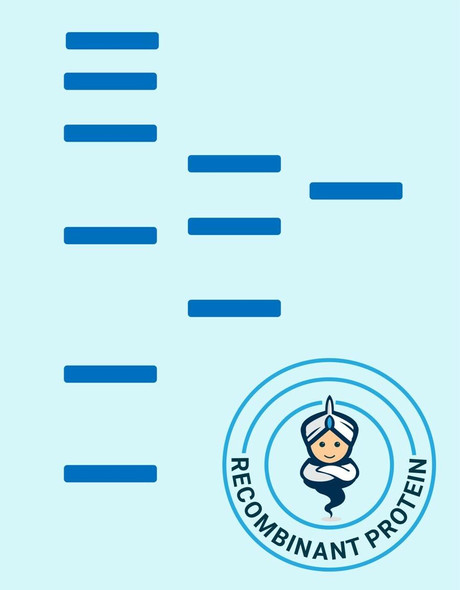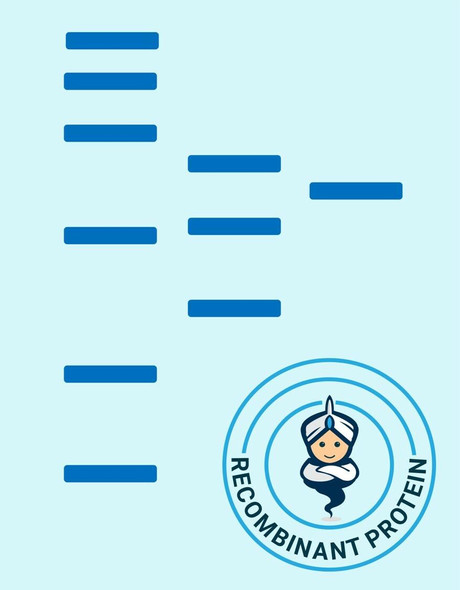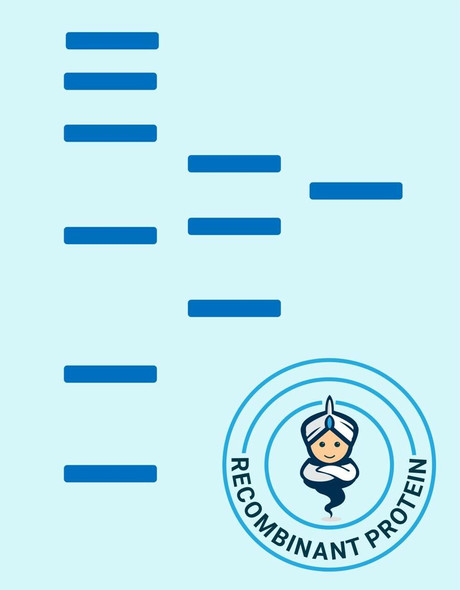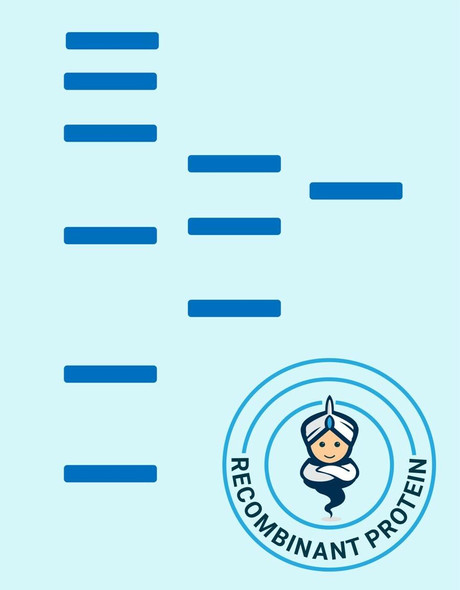Description
| Product Name: | Human CKMT3 Recombinant Protein |
| Product Code: | RPPB2482 |
| Size: | 50µg |
| Species: | Human |
| Target: | CKMT3 |
| Synonyms: | Creatine kinase M-type, EC 2.7.3.2, Creatine kinase M chain, M-CK, CKM, CKMM, CKMMITIII. |
| Source: | Pichia Pastoris |
| Physical Appearance: | Sterile Filtered colorless liquid formulation. |
| Formulation: | Each mg of protein contains 20mM Tris pH-8, 1mM EDTA and 1mM DTT. |
| Stability: | CKMT3 although stable at 15°C for 7 days, should be stored below -18°C. Please prevent freeze-thaw cycles. |
| Purity: | Greater than 95.0% as determined by(a) Analysis by RP-HPLC. (b) Analysis by SDS-PAGE. |
| Biological Activity: | The biological activity measured by the enzymatic activity of Creatine phosphokinase procedure No.45-UV, 1IU-1 �mole creatine phosphate was 500 IU/mg at 37 degrees celsius corresponding to a Specific Activity of 2,000ng/ml. |
The three isoenzymes (MM, MB, and BB) are found in muscle, cardiac and brain tissues. These recombinant proteins are ideal for calibrating diagnostic instruments and researching neuromuscular diseases. Creatine Kinases can be used for indications in many neuromuscular applications. These disorders include cardiac disease, mitochondrial disorders, inflammatory myopathies, myasthenia, polymyositis, McArdle's disease, NMJ disorders, muscular dystrophy, ALS, hypo and hyperthyroid disorders, central core disease, acid maltase deficiency, myoglobinuria, rhabdomyolysis, motor neuron diseases, rheumatic diseases, and other that create elevated or reduced levels of Creatine Kinases.
CKMT3 Human Recombinant produced in Pichia Pastoris is a glycosylated polypeptide chain having an identical amino acid sequence compared to the native enzyme, purified under non-denaturing conditions and reacts with polyclonal antibodies to MM Isoenzyme in ELISA.The CKMT3 is purified by proprietary chromatographic techniques.
| UniProt Protein Function: | CKM: Reversibly catalyzes the transfer of phosphate between ATP and various phosphogens (e.g. creatine phosphate). Creatine kinase isoenzymes play a central role in energy transduction in tissues with large, fluctuating energy demands, such as skeletal muscle, heart, brain and spermatozoa. Belongs to the ATP:guanido phosphotransferase family. |
| UniProt Protein Details: | Protein type:Amino Acid Metabolism - arginine and proline; Kinase, other; EC 2.7.3.2 Chromosomal Location of Human Ortholog: 19q13.32 Cellular Component: cytosol Molecular Function:creatine kinase activity; ATP binding Biological Process: phosphocreatine biosynthetic process; phosphorylation; creatine metabolic process |
| NCBI Summary: | The protein encoded by this gene is a cytoplasmic enzyme involved in energy homeostasis and is an important serum marker for myocardial infarction. The encoded protein reversibly catalyzes the transfer of phosphate between ATP and various phosphogens such as creatine phosphate. It acts as a homodimer in striated muscle as well as in other tissues, and as a heterodimer with a similar brain isozyme in heart. The encoded protein is a member of the ATP:guanido phosphotransferase protein family. [provided by RefSeq, Jul 2008] |
| UniProt Code: | P06732 |
| NCBI GenInfo Identifier: | 125305 |
| NCBI Gene ID: | 1158 |
| NCBI Accession: | P06732.2 |
| UniProt Secondary Accession: | P06732,Q96QL9, |
| UniProt Related Accession: | P06732 |
| Molecular Weight: | Calculated: 40kDaObserved: 43kDa |
| NCBI Full Name: | Creatine kinase M-type |
| NCBI Synonym Full Names: | creatine kinase, muscle |
| NCBI Official Symbol: | CKM�� |
| NCBI Official Synonym Symbols: | CKMM; M-CK�� |
| NCBI Protein Information: | creatine kinase M-type; creatine kinase M chain |
| UniProt Protein Name: | Creatine kinase M-type |
| UniProt Synonym Protein Names: | Creatine kinase M chain; M-CKCreatine kinase M-type, N-terminally processed |
| Protein Family: | Creatine kinase |
| UniProt Gene Name: | CKM�� |
| UniProt Entry Name: | KCRM_HUMAN |









